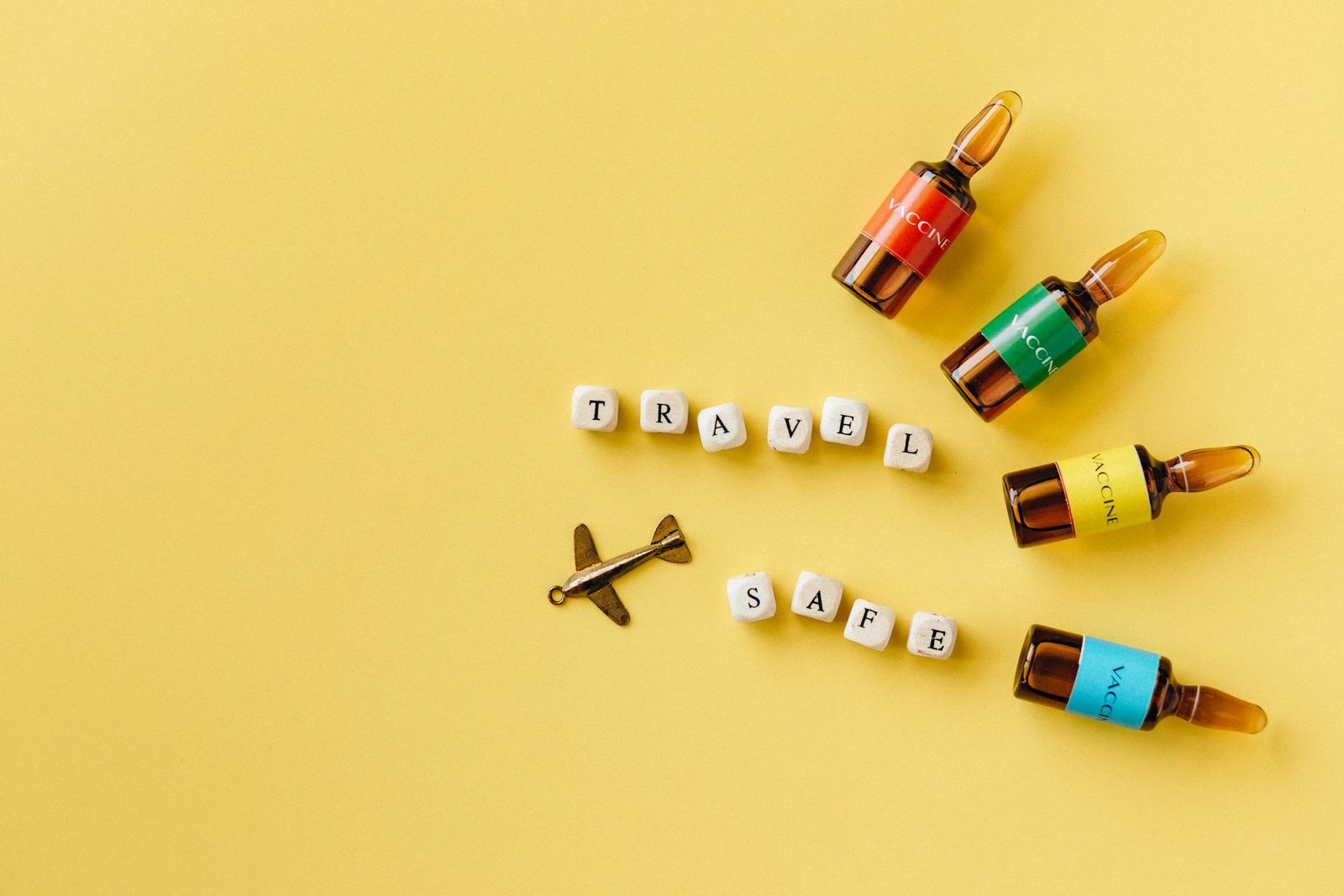
Traveling in 2025 isn’t quite as simple as tossing a battered duffel over your shoulder and hoping for the best. The world, lovely and unpredictable as ever, hasn’t decided to go easy on wanderers. So, before you romanticize that sunrise over the Himalayas or start planning your street food tour across Southeast Asia, there’s the practical business of vaccines—yes, those tiny jabs with big consequences.
You might notice: destination requirements seem to shift each season, almost like airline baggage rules—but with public health at stake. Governments are watchful; airlines, suspicious; mosquitoes, as stubborn as always. The buzz can be overwhelming. “Do I really need a typhoid shot?” you wonder, scrolling through forums where half the replies contradict the other half. The answer, perhap wonderfully and annoyingly, is “it depends.” Where you’re headed, for how long, what you’re planning to do (are you more resort pool or jungle trek?), even your personal medical quirks—these all factor in.
I learned this the hard way during a particularly memorable (read: horrific) bout of traveler’s diarrhea in Morocco. Spoiler alert: it wasn’t just the street food. Sometimes the smallest oversight can turn your dream vacation into a medical nightmare that costs more than your entire trip budget.
So let’s talk vaccines. Not the boring medical textbook version, but the real-world, practical guide that’ll keep you healthy and your wallet happy.
Why Travel Vaccinations Actually Matter (Beyond the Obvious)
Look, I get it. Nobody wants to spend an afternoon getting poked with needles when you could be researching the best rooftop bars in Lisbon. But here’s the thing—travel vaccinations aren’t just about avoiding exotic diseases with names you can’t pronounce. They’re about protecting yourself, the communities you visit, and frankly, your bank account.
The World Health Organization reports that vaccine-preventable diseases still cause significant illness and death globally. When you travel, you’re not just exposed to new cultures and cuisines—you’re exposed to different disease patterns and immunity levels.
Plus, medical tourism isn’t always voluntary. Emergency medical evacuation insurance might cover the helicopter ride, but it won’t cover the three weeks of lost vacation time or the stress of explaining to your boss why you’re calling in sick from a hospital bed in Guatemala.
The Essential Travel Vaccines: Your Pre-Trip Shot List
Routine Vaccines (The Boring But Vital Ones)
Before we dive into the exotic stuff, let’s talk about the vaccines you probably already have but might need boosters for:
MMR (Measles, Mumps, Rubella): Measles cases have been climbing globally, and nobody wants to spend their Roman holiday covered in spots. The CDC recommends ensuring you’re up to date, especially if you were born after 1957.
Tdap (Tetanus, Diphtheria, Pertussis): Tetanus lurks everywhere—rusty nails, dirty wounds, that sketchy scooter rental in Bali. You need a booster every 10 years, and trust me, tetanus isn’t something you want to gamble with.
Flu Shot: Seasons flip when you cross hemispheres, and airplane cabins are basically flying petri dishes. Get your annual flu shot, regardless of when you’re traveling.
Hepatitis A and B: The Dynamic Duo
Hepatitis A spreads through contaminated food and water—basically every street food lover’s nightmare. Hepatitis B transmits through blood and bodily fluids. Both can ruin your trip and potentially your liver.
The good news? The Hepatitis A vaccine is nearly 100% effective, and you can get a combination Hep A/B shot called Twinrix. Two shots, six months apart, and you’re covered for life against Hep A and 20+ years against Hep B.
I always tell people: if you’re going anywhere that isn’t Western Europe, North America, Australia, or Japan, get these shots. Even if you’re the most cautious eater on the planet, accidents happen.
Typhoid: The Sneaky One
Typhoid fever spreads through contaminated food and water, particularly in South Asia, Southeast Asia, and parts of Africa and Latin America. You’ve got two options: an oral vaccine (four pills over a week) or a single injection.
Pro tip: if you’re prone to forgetting pills, go with the shot. I learned this after taking three of the four oral vaccine pills before a trip to India and realizing I’d basically wasted my time and money.
Destination-Specific Vaccines: Where Geography Meets Medicine
Yellow Fever: The One With Paperwork
Yellow fever vaccination isn’t just recommended for certain destinations—it’s legally required. Countries in tropical Africa and South America either require proof of vaccination for entry or strongly recommend it.
Here’s where it gets tricky: you can only get the yellow fever vaccine at WHO-approved vaccination centers. You can’t just waltz into any clinic. The vaccine takes 10 days to become effective, and the certificate is valid for life.
Some countries require yellow fever vaccination if you’re arriving from a country with risk of transmission—even if you were just transiting through the airport. Always check requirements for your specific itinerary.
Japanese Encephalitis: For the Long-Term Adventurers
If you’re spending more than a month in rural areas of Asia during transmission season (varies by country), Japanese encephalitis vaccination might be worth considering. It’s expensive—around $300 for the two-shot series—but JE has a 30% fatality rate and leaves many survivors with permanent neurological damage.
I only recommend this for long-term travelers, expats, or those planning extensive rural travel during peak mosquito season.
Meningitis: College Dorms and Hajj Pilgrims
Meningococcal meningitis is required for Hajj pilgrimage to Saudi Arabia and recommended for parts of sub-Saharan Africa during dry season (December to June). The “meningitis belt” stretches across Africa from Senegal to Ethiopia.
Even if you’re not headed to high-risk areas, consider it if you’re staying in hostels or doing anything involving close contact with lots of people from different countries.
Timing Is Everything: When to Get Vaccinated
Here’s something nobody tells you until it’s too late: vaccines don’t work immediately. Your immune system needs time to build protection, and some vaccines require multiple doses spaced weeks apart.
Start planning 4-6 weeks before travel—earlier if you need yellow fever or Japanese encephalitis. Some vaccines (like Hepatitis B) work better with more time between doses.
I once had a client who booked a last-minute trip to Kenya and came in three days before departure wanting “all the shots.” We did what we could, but she wasn’t fully protected, and spent her entire safari worried about every mosquito bite.
The Real Cost of Travel Vaccines
Let’s talk money. Travel vaccines aren’t cheap, and insurance coverage varies wildly. Here’s what you’re looking at:
- Hepatitis A/B combination: $200-300 for full series
- Yellow Fever: $200-300 (one-time cost)
- Typhoid: $80-150
- Japanese Encephalitis: $250-350 for full series
- Meningitis: $150-200
Before you have sticker shock, consider this: hepatitis A treatment can cost thousands, and medical evacuation insurance starts around $40,000. Suddenly those vaccine costs look pretty reasonable.
Some insurance plans cover travel vaccines as preventive care, others don’t. Check with your provider, and consider using a Health Savings Account (HSA) if you have one.
Where to Get Travel Vaccines
You’ve got several options, each with pros and cons:
Travel Medicine Clinics: Most comprehensive, but also most expensive. Places like Passport Health specialize in travel medicine and stay current on requirements.
Your Regular Doctor: Might be cheaper if covered by insurance, but may not stock all travel vaccines or stay current on changing requirements.
Pharmacy Clinics: CVS, Walgreens, and others offer many travel vaccines. Convenient and often cheaper, but limited selection.
Health Departments: Often the cheapest option, especially for yellow fever. Call ahead—not all locations offer travel vaccines.
Common Vaccine Myths (And Why They’re Wrong)
“I’m only going to nice hotels, so I don’t need vaccines.” Viruses don’t check your hotel star rating. Hepatitis A can spread through ice cubes, salads, and even apparently clean restaurants.
“Natural immunity is better.” Getting actual hepatitis to avoid a vaccine is like burning down your house to avoid paying property taxes. The risks aren’t comparable.
“Vaccines cause more problems than they prevent.” Serious vaccine reactions are incredibly rare—much rarer than the diseases they prevent. The biggest risk is usually a sore arm.
“I can just take antibiotics if I get sick.” Many vaccine-preventable diseases are viral (antibiotics don’t work) or have become antibiotic-resistant.
Special Considerations
Pregnant Travelers
Most live vaccines are off-limits during pregnancy, but killed/inactivated vaccines like hepatitis A, typhoid (injection), and meningitis are generally safe. Always consult your obstetrician and a travel medicine specialist.
Immunocompromised Travelers
If you’re on immunosuppressive medications, have HIV, or are undergoing cancer treatment, vaccine effectiveness might be reduced and live vaccines could be dangerous. This requires specialized consultation.
Last-Minute Travelers
Even if you’re leaving tomorrow, some protection is better than none. Hepatitis A vaccine provides some protection within two weeks, and you can get immunoglobulin for immediate (but temporary) protection.
Beyond Vaccines: The Complete Prevention Picture
Vaccines are just one piece of the travel health puzzle. You’ll also want to consider:
- Malaria prevention: Antimalarial medications for high-risk areas
- Insect repellent: DEET or picaridin-based for mosquito-borne diseases
- Safe food and water practices: When in doubt, don’t
- Travel insurance: Including medical evacuation coverage
Making the Decision: What’s Right for Your Trip
Not every traveler needs every vaccine. Your risk depends on:
- Destination: Urban vs. rural, developed vs. developing
- Duration: Weekend trip vs. month-long adventure
- Activities: Beach resort vs. jungle trekking
- Season: Dry vs. rainy, peak transmission times
- Your health: Age, immune status, chronic conditions
A weekend in Paris requires different preparation than a month volunteering in rural Guatemala.
The Bottom Line
Travel vaccinations might not be Instagram-worthy, but they’re one of the smartest investments you can make in your trip. I’ve seen too many travelers learn this lesson the expensive way—either through actual illness or the stress of worrying about it throughout their entire vacation.
Start planning early, do your research, and don’t let cost be the deciding factor when it comes to your health. Your future self, somewhere amazing and healthy, will thank you.
Remember: the goal isn’t to be scared of travel—it’s to be prepared for it. With the right vaccinations and precautions, you can focus on what really matters: making memories that’ll last longer than any vaccine side effects.
Travel Vaccination FAQs
Question: How far in advance should I get travel vaccinations? Ans: Start planning 4-6 weeks before departure. Some vaccines need multiple doses or take time to become effective. Yellow fever requires 10 days to build immunity, while hepatitis B works best with longer intervals between shots.
Question: Do I need vaccinations for travel within Europe? Ans: For most of Western Europe, routine vaccinations are sufficient. However, tick-borne encephalitis vaccination is recommended for hiking in certain forests in Central and Eastern Europe during spring and summer.
Question: Can I get travel vaccines while pregnant? Ans: Some vaccines are safe during pregnancy (hepatitis A, typhoid injection, meningitis) while others are not (yellow fever, live typhoid). Always consult both your obstetrician and a travel medicine specialist.
Question: What happens if I can’t get vaccinated due to medical conditions? Ans: Work with a travel medicine specialist to assess risks and develop alternative protection strategies. This might include avoiding high-risk areas, enhanced precautions, or medical exemption letters for required vaccines.
Question: Are travel vaccinations covered by insurance? Ans: Coverage varies widely. Some plans cover vaccines as preventive care, others don’t cover travel-specific vaccines at all. Check with your insurance provider and consider using an HSA if available.
Question: How long do travel vaccinations last? Ans: It varies by vaccine. Yellow fever and hepatitis A provide lifetime protection, hepatitis B lasts 20+ years, while typhoid and meningitis need boosters every 2-5 years. Keep your vaccination records updated.
Question: Can I get multiple vaccines at the same time? Ans: Yes, you can receive multiple vaccines during the same visit. They’re typically given in different arms to minimize soreness. There’s no evidence that getting multiple vaccines reduces their effectiveness.
Question: What should I do if I have a severe needle phobia? Ans: Discuss options with your healthcare provider. Some vaccines are available orally (like typhoid), and there are techniques to manage needle anxiety. The risks of vaccine-preventable diseases usually outweigh phobia concerns.
Question: Do children need different travel vaccinations? Ans: Children follow the same general guidelines but may need different dosing or timing. Some vaccines aren’t approved for young children. Consult a pediatric travel medicine specialist for children under 2.
Question: What’s the difference between required and recommended vaccines? Ans: Required vaccines are legally mandated for entry (like yellow fever for certain countries). Recommended vaccines are medically advised based on disease risk but not legally required. Both are important for your health.
Question: Can I get vaccinated while taking antibiotics? Ans: Most vaccines can be given while on antibiotics, but live vaccines might be less effective if you’re on certain medications. Discuss timing with your healthcare provider.
Question: What should I pack in my travel health kit besides vaccinations? Ans: Include prescription medications, basic first aid supplies, insect repellent, hand sanitizer, water purification tablets, and copies of your vaccination records. Pack medications in carry-on luggage.
Recommended Travel Health Resources
- CDC Travel Health Website – Comprehensive destination-specific health information and vaccine requirements updated regularly.
- Passport Health Travel Clinics – Nationwide network of travel medicine specialists offering vaccines and consultations.
- Travel Medicine International – Find certified travel medicine clinics and practitioners worldwide.
- Yellow Fever Vaccination Center Locator – Official directory of authorized yellow fever vaccination centers.
- World Health Organization International Travel Requirements – Official country-by-country vaccination requirements and health recommendations.
- GeoSentinel Global Surveillance Network – Real-time travel health data and disease outbreak information.
- Travel Insurance Comparison – InsureMyTrip – Compare travel insurance policies including medical coverage and evacuation benefits.
- IATA Travel Requirements – Airline industry tool for checking destination health requirements and travel restrictions.
- Fit for Travel NHS – UK-based comprehensive travel health information and country-specific advice.
- Travel Medicine Inc. Clinic Network – Directory of travel medicine specialists and vaccine availability by location.
- CVS MinuteClinic Travel Health – Convenient pharmacy-based travel vaccination services and consultations.
- Walgreens Travel Health Services – Accessible travel vaccines and health consultations at pharmacy locations.
- International Association for Medical Assistance to Travelers – Global network providing travel health information and medical assistance abroad.
- TravelHealthPro by UK Health Security Agency – Professional travel health resource with detailed country information and outbreak alerts.
- Global Entry/TSA PreCheck Application – Expedited security screening that can reduce airport health screening delays.






